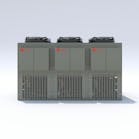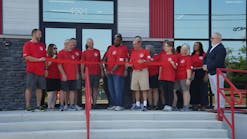HARDI members should be planning on a good year in 2013 – not a great year, but a good year. Sales for 2013 should be up year-over-year from 2012. In general, members should also plan on the first six months being stronger than the last six months. The outlook is consistent with our presentations at the annual and regional meetings as well as in the quarterly reports.
Job creation, low interest rates and banks flooded with cash all bode well for the HVAC industry as we traverse 2013. Projections show housing starts ending in 2013 at 835,000 units, up 8.9 percent from 2012. If you were profitable in 2012, you should be looking forward to 2013, but remember that the first half of the year will be better than the second half. Avoid the mistake of straight-line forecasting and the associated misallocation of resources.
Expectations are that construction spending on home improvement will reach a zenith of approximately $122.7 billion around March 2013 (annual spend rate). Spending for the year is projected to come in at a thin 2.1 percent below 2012. The mild contraction in the second half of 2013 will come because of increasing consumer difficulties, not the least of which will be higher taxes on all income earners.
It is popular to think that only high-income earners and corporations will be paying more taxes in 2013. The reality is that middle-income earners in 2013 will be paying from $2,000 to $3,000 more in federal taxes per two-income household. This is a direct result of the return of FICA taxes to the pre-rollback level and a 0.9 percent increase in the Medicare tax (a provision of the Obamacare legislation).
Consumers will also be facing mild, but nagging, inflationary pressures in 2013 in such areas as food, fuel, property tax increases and the cost of just about any item coming in from China. The Federal Reserve Board will tolerate these inflationary pressures, so an increase in interest rates is unlikely, but that does not mean there will not be a subtle loss of purchasing power by U.S. consumers. People will be working harder to make ends meet in the latter half of 2013, and that will reduce the propensity to remodel the home and/or replace the A/C unit. Expect consumers to talk more in terms of repairs than replacement as discretionary spending is squeezed.
The same subtle inflationary pressures will impact HARDI members as well, as both employees and the distributorship experience a slowly shrinking dollar. Members can take advantage of the coming trend by locking in advertising and other longer-term costs early in the year, before the inflationary pressures become generally recognized.
ITR Economics’ stable of accurate leading indicators is unequivocal about more economic expansion in the U.S. in 2013. There are growing indications as we go to press that the economy will soften later in the year. Recent negative trends in the ITR Leading Indicator and in our Corporate Bond Prices indicator suggest that we are on track with our forecast of a downturn in the U.S in late 2013 and in 2014. Longer-term planning should include plans for a mild recession in the U.S. housing market in 2014. Think in terms of a 6.0 percent year-over-year decline in housing starts in 2014.
HARDI members selling into the private nonresidential market will fare better over the next two years. Spending stands at $293.9 billion when we went to press, up 15.0 percent year-over-year on an annual basis. The rate of rise is not sustainable, but the amount of money spent will continue to climb. The forecast places spending for all of 2013 at $305.5 billion, up 3.5 percent over 2012. A 4.5 percent increase is projected for 2014 with nonresidential nonconstruction spending for the year reaching $319.2 billion. Funding for many of these projects is already in place, and contracts have been let for 2013. Contractors in the nonresidential realm should provide HARDI members with solid sales and profit opportunities in the coming two years.
The “fiscal cliff” may have been successfully managed by the time we go to press; however, as of the moment, the President has said he will let the country go over the fiscal cliff if Republicans do not agree to higher tax rates for high-income individuals and more tax revenue from corporations. There is no scenario that produces a win for successful distributors who are flow-through entities. Expect to pay more taxes in 2013, which means less free cash for operations and for strategic initiatives.
Europe is not going to throw the United States into recession in 2013. The leading indicators are suggesting that the European economy will soon be stabilizing. Efforts toward a pan-European banking regulatory environment will result in increased trust in the banking system, further enhancing the economic outlook for Europe. Germany’s refusal to consider a Euro Bond will slow the turn to prosperity, but it is unlikely to derail it entirely given the halfway measures upon which they have agreed.
China is showing signs of life. This is good news in terms of increased demand for U.S.-made goods and our domestic economy. It is also consistent with our projection of mild global inflationary pressures in 2013 as their appetite for raw materials heats up once more.
HARDI members in general should be mindful of the need for cash as we enter 2014. This is especially true of members who have a strong residential customer base. Competing pressures will make this a tough task, but it should be a major goal for 2013.
Follow ITR on Twitter @ITROutlook. You can also keep current with the latest developments through our blog at www.itreconomics.com/blog.
Alan Beaulieu is president of the Institute for Trends Research and HARDI’s chief economist. For more information, contact Beaulieu at 603/796-2500 or [email protected] or visit www.itreconomics.com.










